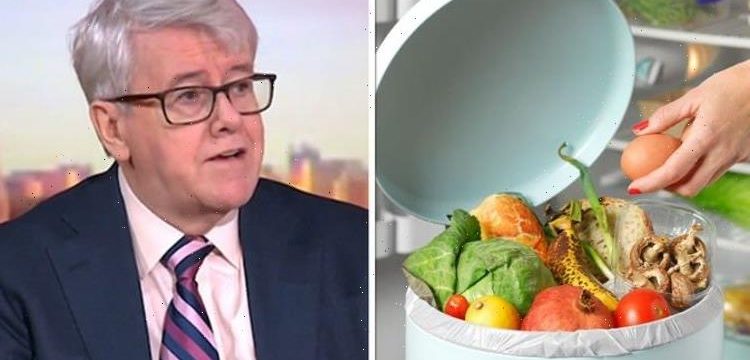Food waste: John Allan discusses sell-by-dates
We use your sign-up to provide content in ways you’ve consented to and to improve our understanding of you. This may include adverts from us and 3rd parties based on our understanding. You can unsubscribe at any time. More info
Tesco chairman John Allan appeared on BBC One this morning to speak about rising food prices, among other topics. Speaking about reducing food waste in British homes, Mr Allan seemed to suggest Tesco may get rid of sell-by dates in the future.
Speaking to presenter Sophie Raworth, Mr Allan said he eats bread past its sell-by date and believes “many other people do”.
He revealed that sell-by date stickers are likely to change in the coming years, saying: “There is a re-appraisal going on at the moment about whether sell-by or eat-by dates are over conservative, and I think that’s going to change in the years ahead.
“Quite a lot of those dates will come off.”
The Tesco boss added: “I know I can keep bread in the fridge for quite a long time beyond its official life and I think savvy customers realise that as well.”

The main reason for the potential change in sell-by dates will be to encourage shoppers to waste less food at home, according to Mr Allan.
He said: “Food waste in the home is actually much greater than food waste in our stores.”
The chairman explained that Tesco has been working “relentlessly” to limit food waste in its shops and distribution chain, but “people waste far more food at home”.
He added: “And I think one of the things we have to do is to help shoppers realise that there are ways in which they can have less food waste at home.”
Mr Allan spoke about rising food prices too and how, due to the increase in the energy price cap, some lower income households across Britain will find it difficult to both feed their families and heat their homes.
The Tesco boss said his supermarket is trying its best to decrease food prices.
“Wherever we can, we are pulling prices down,” he explained.
For example, the cheapest tin of beans in Tesco currently costs 22p, while its price five years ago was 25p.

Mr Allan continued: “I predicted last autumn that food prices by the spring might be rising about five percent.
“I sincerely believe that it’s not going to be any more than that.
“It might even be slightly less.
“But that’s the sort of number we’re talking about.”

However, the chairman pointed out that for the “least well off families”, an increase of five percent is significant.
He added: “People may have to struggle to choose between heating their homes and feeding their families.
“And that’s clearly not a situation that any of us should tolerate.”
The energy price cap in Britain is to increase by £693 from April, according to Ofgem, with some UK regions hit harder than others.
North Wales and Merseyside have the highest electricity bills in the country, according to new government data from the Department for Business, Energy, and Industrial Strategy.
Source: Read Full Article
